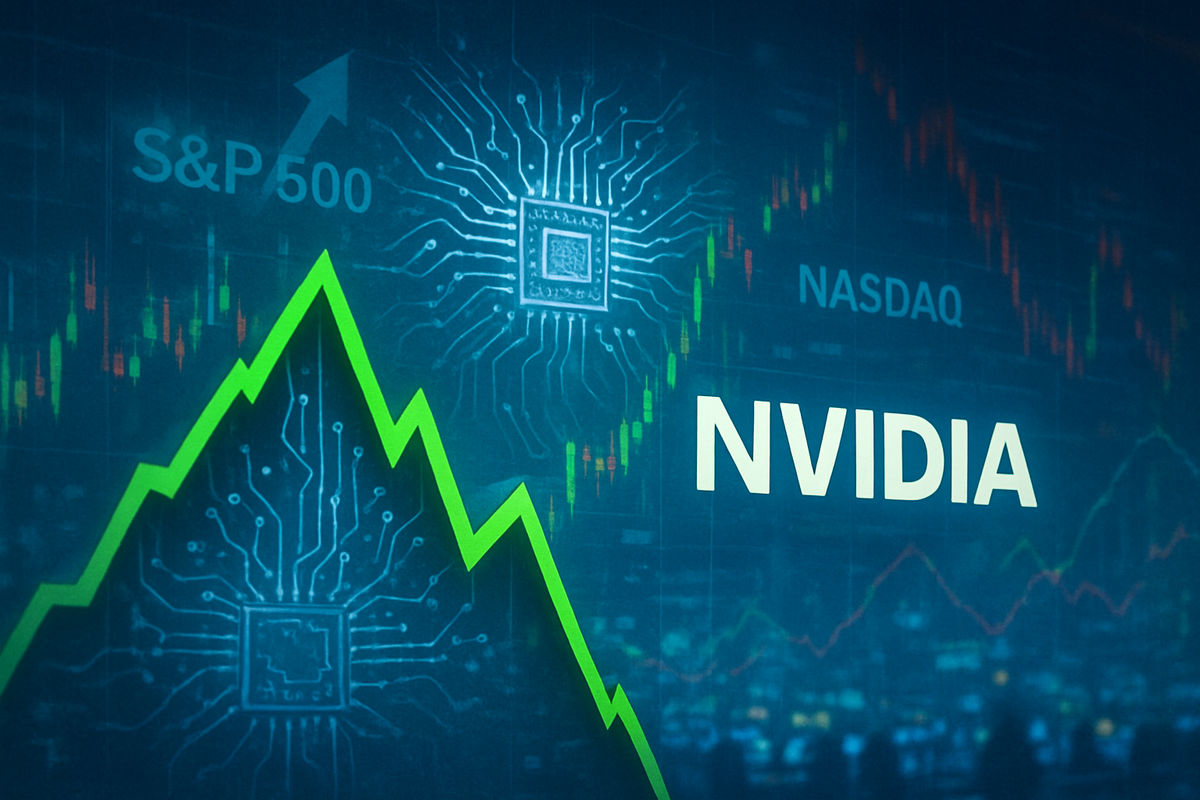
Nvidia (NASDAQ: NVDA), the undisputed leader in AI semiconductors, has found itself navigating a turbulent market in November 2025. Despite reporting stellar third-quarter fiscal 2026 results that far exceeded expectations, the company's stock has experienced significant volatility and a notable correction, fueling broader market anxieties about a potential "AI bubble." This paradoxical situation—record performance met with investor caution—has sent ripples across major indexes like the S&P 500 and Nasdaq, prompting a re-evaluation of high-growth tech valuations and the sustainability of the current AI boom.
This period of intense scrutiny highlights a critical juncture for the tech sector, as market participants weigh Nvidia's undeniable technological prowess and overwhelming demand against concerns of overvaluation and external pressures. The company's performance is not merely an isolated event but a bellwether, signaling broader shifts in investor sentiment and economic outlook within the rapidly expanding artificial intelligence landscape.
Unpacking Nvidia's Recent Struggles and Market Ripple Effects
Nvidia's recent struggles are multifaceted, stemming from a confluence of market sentiment and geopolitical realities. Throughout November, the specter of an "AI bubble" has haunted investors, leading to a widespread "risk-off" environment. Nvidia's stock, a bellwether for the AI sector, bore the brunt of this sentiment, experiencing declines of 3.6% on November 14 and a further 2.8% on November 18, pushing its monthly loss past 10% into correction territory. Even a robust Q3 earnings report, showcasing record revenue of $57 billion (a 62% year-over-year increase) and data center revenue of $51.2 billion (up 66% year-over-year), failed to sustain a rally, with the stock ending down 3.2% on November 20 and 2.5% on November 21, creating a "market fakeout" for investors.
Adding to the pressure, Japan's SoftBank (TYO: 9984) divested its entire stake in Nvidia around November 14, a move that amplified sector-wide declines and triggered investor reassessments of AI businesses. Geopolitical headwinds, specifically U.S. export restrictions on advanced chips to China, continue to pose a significant challenge. China, which accounted for approximately 13% of Nvidia's revenue last fiscal year, has become largely inaccessible for certain products, causing disappointment for the firm and raising concerns about future revenue streams. Furthermore, some market observers are questioning the ultimate profitability of the substantial investments being poured into AI infrastructure, including "circular funding deals" where chipmakers invest in AI companies in exchange for chip purchases, raising skepticism about long-term returns for hardware customers.
The immediate implications on the broader market have been pronounced. Nvidia's stock struggles have frequently triggered wider tech sell-offs and increased volatility across global markets. A tech sell-off led by Nvidia contributed to Wall Street's worst day in a month in mid-November, with European and Asian markets also reacting negatively. The contagion of AI bubble fears has spread to other AI-related stocks and led to a "risk-off" sentiment, with investors divesting from assets like Bitcoin and major tech companies such as Meta Platforms (NASDAQ: META), Microsoft (NASDAQ: MSFT), Amazon (NASDAQ: AMZN), and Alphabet (NASDAQ: GOOGL). This tempered optimism in the semiconductor sector, despite projections for significant growth in 2025, underscores the market's sensitivity to Nvidia's performance and the prevailing geopolitical and valuation anxieties.
Winners and Losers in the AI Market Crucible
The current market dynamics surrounding Nvidia create a mixed bag for various stakeholders, delineating potential winners and losers in the unfolding AI market narrative. Nvidia (NASDAQ: NVDA) itself, despite recent stock struggles and valuation jitters, remains fundamentally strong due to "insatiable AI demand." CEO Jensen Huang's emphatic statements that "Blackwell sales are off the charts, and cloud GPUs are sold out" underscore the company's dominant position and the critical role its hardware plays in the global AI buildout. In the long run, if the AI market continues its projected growth to a staggering $3-$4 trillion opportunity by the end of the decade, Nvidia stands to be a significant winner, provided it can adeptly navigate geopolitical challenges and maintain its technological edge. Its strong Q4 fiscal 2026 guidance, projecting approximately $65 billion in revenue, further signals continued robust demand.
On the losing side, investors who bought into Nvidia at its peak or were caught unaware in the recent sell-offs have seen their portfolios diminish. Other AI-related companies, particularly those with high valuations and less robust fundamentals than Nvidia, are also highly vulnerable to the "AI bubble" fears. Tech giants like Meta Platforms (NASDAQ: META), Microsoft (NASDAQ: MSFT), Amazon (NASDAQ: AMZN), and Alphabet (NASDAQ: GOOGL), while integral to the AI ecosystem, could experience further volatility if the "risk-off" sentiment persists, impacting their market capitalizations. Companies heavily reliant on the Chinese market for their tech exports, or those competing directly with Nvidia in less differentiated segments, may also face increased pressure as geopolitical restrictions reshape market access and competitive landscapes.
Conversely, some companies might emerge as indirect beneficiaries or resilient players. Firms providing essential infrastructure around AI, such as advanced cooling solutions, specialized data center construction, or renewable energy providers powering these energy-intensive AI facilities, might see sustained demand regardless of individual chipmaker stock fluctuations. Furthermore, companies that offer AI software and services, particularly those with recurring revenue models and clear paths to profitability, might find themselves less exposed to the hardware-centric valuation concerns, potentially attracting investor capital seeking more stable growth within the AI paradigm.
Broader Significance: AI's Maturation and Global Realignment
Nvidia's recent performance is more than just a story about one company; it's a critical barometer for the broader technology sector and the global economy. The pervasive "AI bubble" concerns, largely amplified by Nvidia's high valuation and subsequent correction, have triggered a wider "risk-off" sentiment across financial markets. This has led to sell-offs not just in tech but also in other speculative assets like Bitcoin, indicating a broader market recalibration of risk. The situation highlights the inherent tension between revolutionary technological advancement and the speculative excesses that often accompany new paradigms, forcing a crucial re-evaluation of investment strategies.
This event fits into broader industry trends of increasing geopolitical fragmentation, particularly concerning technological supremacy between the U.S. and China. U.S. export restrictions not only directly impact Nvidia's revenue from a key market but also accelerate China's efforts to develop indigenous chip capabilities, potentially leading to a more bifurcated global tech ecosystem. This push for technological self-sufficiency by major economic blocs could reshape supply chains, foster new regional champions, and intensify competition in the long term. Regulatory implications could also emerge if governments perceive the AI market as becoming too concentrated, or if "circular funding deals" raise antitrust concerns about market manipulation or unfair competitive advantages.
Historically, parallels can be drawn to the dot-com bubble of the late 1990s, where genuine technological innovation was overshadowed by unsustainable valuations and speculative investment. However, many analysts maintain that the current AI boom is different due to the tangible and transformative impact of AI across industries, coupled with Nvidia's proven profitability and market dominance. While the "AI bubble chatter" might suggest a period of market maturation and potentially painful corrections for some overvalued entities, the underlying demand for AI infrastructure is widely considered fundamental and long-lasting, suggesting a more nuanced scenario than a complete bust.
The Road Ahead: Navigating Volatility and Strategic Shifts
The immediate future for Nvidia and the broader market likely involves continued volatility as investors grapple with the dual realities of robust AI demand and elevated valuations. Short-term, market participants will closely watch Nvidia's subsequent earnings reports and guidance for any signs of sustained impact from export restrictions or a slowdown in AI infrastructure spending. The company's ability to develop new, compliant products for restricted markets, or to significantly expand its footprint in unrestricted regions, will be key indicators of its adaptability. Strategic pivots by Nvidia could include further diversification of its customer base beyond the cloud hyperscalers, aggressive expansion into new geographical markets outside of China, and continued investment in software and services to enhance its ecosystem lock-in and create more recurring revenue streams.
Long-term, the market will seek clearer evidence of the profitability and return on investment from the substantial capital poured into AI infrastructure. If the promised efficiency gains, new product developments, and economic benefits materialize for customers, confidence will rebound, and valuations may stabilize or resume an upward trajectory. If, however, the returns prove elusive for a significant number of AI adopters, a more significant re-rating of the entire AI sector could occur, leading to a prolonged period of consolidation or even contraction for less viable players.
Market opportunities may emerge for astute investors with a long-term perspective to acquire fundamentally strong companies like Nvidia during periods of irrational exuberance or fear-driven sell-offs. Challenges include navigating persistent geopolitical tensions, the potential for increased competition as other chipmakers and even major tech companies develop their own AI accelerators, and the ongoing debate about the true size and sustainability of the "AI bubble." Potential scenarios range from a healthy market correction that prunes overvalued assets while allowing genuine innovation to thrive, to a more severe downturn if the "AI bubble" bursts more dramatically, potentially impacting global economic growth and investor confidence for years to come.
Conclusion: A Defining Moment for the AI Era
Nvidia's journey through November 2025 encapsulates the complex and often contradictory nature of modern financial markets, particularly within a transformative technological revolution. While the company continues to demonstrate unparalleled financial strength and technological leadership in the burgeoning AI sector, it simultaneously faces intense scrutiny over its valuation and significant geopolitical headwinds. The key takeaway is the delicate balance between groundbreaking innovation and market speculation—a tension that will define the AI era's financial landscape. Nvidia's performance serves as a critical bellwether, influencing investor sentiment across the tech sector and beyond, making it a focal point for understanding broader market trends.
Moving forward, investors should remain vigilant, prioritizing fundamental value over speculative hype. Monitoring Nvidia's ability to navigate export restrictions, its strategic responses to increasing competition, and the actual return on investment for AI infrastructure will be crucial. The coming months will likely test the resilience of the AI market, providing a clearer picture of whether current valuations are sustainable or if a more significant re-calibration is on the horizon. This period will define not just Nvidia's trajectory but also the broader trajectory of the AI revolution in the financial markets, shaping investment strategies and technological development for years to come.
This content is intended for informational purposes only and is not financial advice





